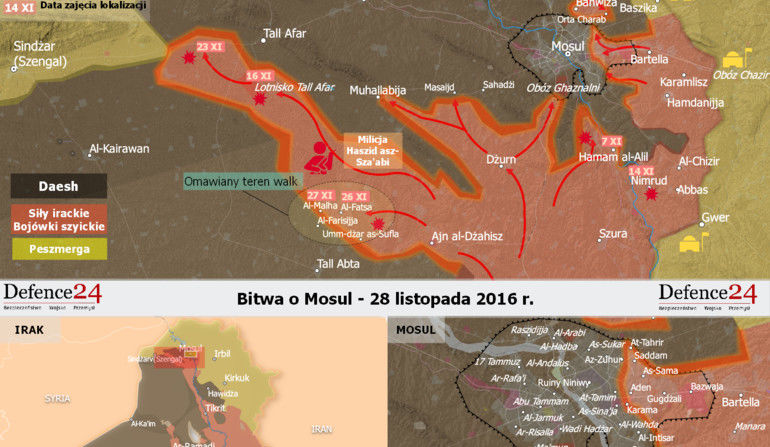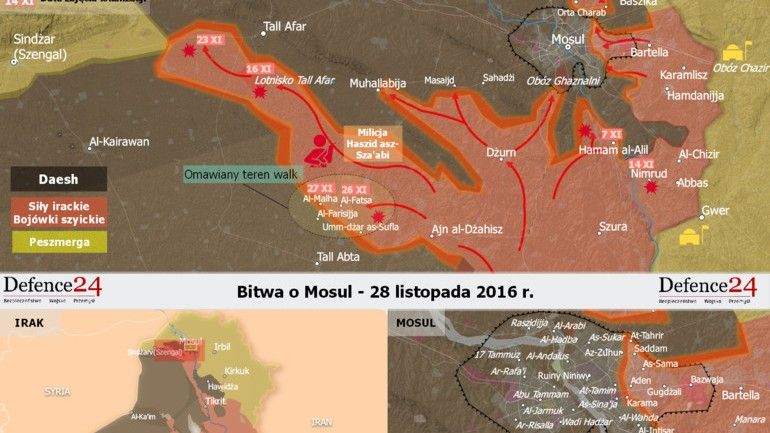On 27th November, Liva Ali Akbar (Hashed Shaabi) continued its advance south-west, from the village of al-Fatsah, which has been conquered on the day before. Since the early morning hours, the villages of al-Malha and al-Farsiyah were being shelled, and armoured diggers began to erect ground fortifications along the line of attack.
Around 10 AM, ca. 500 rebels stood around 2 kilometres away from the two villages. At this stage, reconnaissance took place, with the use of drones and helicopters. The main goal of utilization of the aforesaid assets was to check whether any civilians were still present in the villages. As we were informed by Ali Hamdani, the commander, protection of civilians is seen as a priority, thus the situation is being checked before the attack, in order to avoid any collateral damage. Once it became clear that civilians are not present, artillery shelling was intensified, and the forces gathered near the villages started the attack. The attackers had several tanks, BTR vehicles and Hummvees and Pick-Up trucks, armed with machine guns, at their disposal, along with several armoured vehicles (original upgrades). At the hill, around 3 kilometers from the village of al-Malha, command staff was stationed (30-50 persons with 20 cars, mainly pick-up trucks with machine guns fitted onto them).
The artillery shelling is not precise enough though. As I was told by one of the commanders “this step is seen as knocking on somebody’s door, in preparation for an attack”. Most probably, such strategy is to shock the adversary, and make it impossible for him to defend his positions during the assault. A similar tactical approach has been adopted by YPG, within the terrain of similar shape (al-Hawl operation in the province of Hasakah). There, air-strikes replaced the artillery shelling. However, such “blind” shelling also reveals the deficiencies of the applied tactics.
In the morning, the attackers encountered 4 VBIEDs, all of which were neutralized. The problems started to emerge starting from midday, when it turned out the terrorists are still hiding within the villages, and support from Daesh arrived in al-Farsiyah. Then, Liva Ali Akbar called two helicopters which provided close air support, the goal of which was to neutralize the Daesh positions from the air (with guns and rockets). At that time, more VBIEDs emerged, and after each of the successful shots which neutralized the vehicles, the people gathered at the “staff” hill cheered, yelling “Lebek Ya Hussein” (name of the unit).

Fights for al-Malha and al-Farsiyah are a part of the offensive, the goal of which is to take over the whole semi-arid area of the Nenevah province, south of the Shengal-Tel Afar-Mosul line, and west of the Tigris river. City of Al-Ba’adzh is the main target here, most probably, located 50 kilometers west of al-Farsiyah. From that location, the Syrian border is just several miles away. Hashed Shaabi unit does not rule out entering the Syrian territory, however no specific plans within that scope exist, and all commanders declare that they are going to act in line with the orders issued by PM Haydar al-Abadi who is the formal commander of the Hashed Shaabi.
[[VIDEO-2]]
During the fight for al-Malha and all-Farsiyah, Liva Ali Akbar also suffered from own losses (killed and injured). However, the policy adopted by this formation assumes that losses data is hidden, which is peculiar of other forces operating in the area, including Daesh. This is done for the purpose of maintaining the high level of morale. Thus, no data within that scope is available. According to the information provided by Ali Hamdani, his unit, did not take any Daesh members as prisoners, during the operation. Hamdani stated that, should such thing take place, the prisoners would be transferred to the Hashed Shaabi HQ, from where they would be sent to prison. He added that any information related to violent acts against civilians, committed by Hashed Shaabi, is a part of Daesh-driven propaganda. In particular this refers to the situation in Fallujah and Ramadi, where Liva Ali Akbar was also involved in the fight. Hamdani stated that Hashed Shaabi remains in possession of evidence, that people who delivered information suggesting that Hashed Shaabi attacked the civilians to the humanitarian organizations, were connected to Daesh.
Interview with the commander of the Turkmen Hashed Shaabi Units
Yilmaz al-Nadjir was also present in the al-Maha area. He is the commander of the Turkmen al-Hashed al-Shaabi force, and he was interviewed by us.
How many men are involved in the Turkmen Hashed Shaabi units?
Around 9–10 thousand troops. Only within this region, around 1500 our soldiers are involved in the fight. Moreover, two other Turkmen units – Federal Police No. 92 and Army No. 72 – are also concentrated in the vicinity of Tell Afar. Both units involve around 3 thousand soldiers each. All of the elements above involve Turkmen from Tell Afar and from the Kirkuk province.
What is your stance towards Turkey?
We have nothing against the people, the Turkish citizens. However, we do not want Turkey to come here, to call itself a protector of Turkmen in Iraq. We do not need any help. We are free here, and we want Iraq to be united. We want Iraq and Turkey to be in a friendly relationship.
And what do you think of the statement made by Turkey, suggesting that Hashed Shaabi Shiites should not enter Tel Afar?
It is not Turkey’s call. PM Abadi has already issued orders within that scope, Hashed Shaabi will not enter the city. We will secure the attack, surrounding the city. The assault will involve the Turkmen from the Federal Police (unit no. 92) and from the military (unit no. 72).
How do you asses the relations between Turkmen Shiites and Sunnis? Are you being supported by any Turkmen-Sunnis?
Not “any”, a lot of Sunnis support us. Within all of our units, Sunnis comprise 20-30% of the total quantity of the personnel. Moreover, numerous Turkmen stay in touch with us, providing us with relevant intelligence. It is those men who helped us to create the lists of persons supporting Daesh. The remaining Sunni-Turkmen are safe.
And what about those on the lists? Can we expect a revenge?
No revenge will take place. Iraq is a state governed by the rule of law, and these people will be judged in line with that law.
Witold Repetowicz

